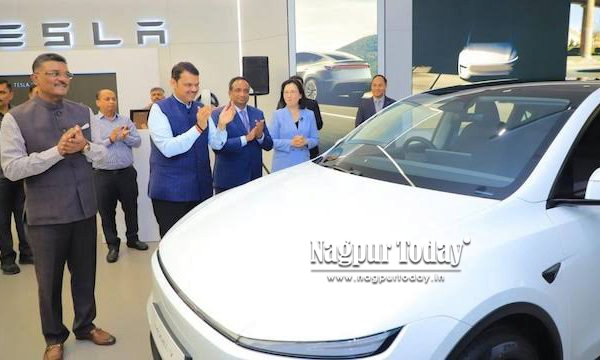 Mumbai: India marked a historic moment in its electric vehicle (EV) journey today as Tesla Inc. officially opened its first showroom in the country at the Maker Maxity Mall in Mumbai’s Bandra-Kurla Complex. The Tesla Experience Centre, inaugurated by Maharashtra Chief Minister Devendra Fadnavis, signifies the culmination of a decade-long engagement between the American EV giant and Indian policymakers.
Mumbai: India marked a historic moment in its electric vehicle (EV) journey today as Tesla Inc. officially opened its first showroom in the country at the Maker Maxity Mall in Mumbai’s Bandra-Kurla Complex. The Tesla Experience Centre, inaugurated by Maharashtra Chief Minister Devendra Fadnavis, signifies the culmination of a decade-long engagement between the American EV giant and Indian policymakers.
This entry is the result of clear and consistent policy directives championed by Union Minister for Road Transport and Highways, Nitin Gadkari, who maintained that Tesla’s entry into India would only be welcomed under one condition: manufacture in India.
“We cannot allow foreign companies to just import vehicles from China and sell in India. Manufacturing here is non-negotiable,” Gadkari reiterated during multiple forums, setting the tone for Tesla’s India strategy.
The Policy Shift That Enabled Tesla’s Entry
In March 2024, the Indian government announced a new EV policy that significantly reduced import duties from 70–100 percent to 15 percent on electric vehicles priced above $35,000. However, these reduced tariffs come with firm conditions:
- Tesla must set up a manufacturing facility in India within three years
- Achieve 25 percent local value addition in three years, and 50 percent within five years
- Limit fully built car imports to a maximum of 8,000 units annually
This policy aligns with the government’s broader aim to develop India as a global EV manufacturing hub, ensuring that global companies investing in India contribute to the local economy and job market. Gadkari’s stand was instrumental in shaping these terms, balancing market openness with the national interest in self-reliant industrial growth.
Tesla’s First Indian Steps
Tesla’s first “Experience Centre” in Mumbai was completed in just 45 days. It showcases the Model Y, which is being imported from Tesla’s Shanghai plant. Two variants are now open for booking:
- Model Y Rear-Wheel Drive: ₹59.89 lakh
- Model Y Long-Range (AWD): ₹67.89 lakh
On-road prices range from ₹61 to ₹68 lakh, which still reflect residual duties on imported cars.
Deliveries are expected to begin in the third and fourth quarters of 2025 respectively. Tesla has also announced plans to install Supercharger networks in Mumbai and Delhi, beginning with four locations in each city. Mumbai’s initial chargers are planned at BKC, Thane, Lower Parel, and Navi Mumbai.
Why Tesla’s Entry Matters
Tesla’s formal entry into India signifies more than the arrival of a luxury EV brand. It is a signal of confidence in India’s policy stability, infrastructure readiness, and market potential. More importantly, it affirms the Modi government’s ability to invite foreign investment on India’s terms — by insisting on domestic manufacturing and value creation.
Gadkari has been a central figure in driving these outcomes, reinforcing a “Build in India” narrative even for the world’s most iconic automobile innovators. His leadership in pushing for sustainable infrastructure, green mobility, and EV-focused industrial growth is now yielding tangible results.
As Reuters and TechCrunch noted, Tesla’s India entry is as much a strategic statement as it is a market move. While the pricing of current models may limit mass adoption, the brand presence is expected to influence India’s luxury EV segment and attract further technology investments.
What Lies Ahead
Tesla has not yet confirmed a manufacturing location in India, though potential sites are being discussed in Maharashtra, Gujarat, and Tamil Nadu. After his meeting with Prime Minister Modi last year in Washington, Elon Musk said, “We will do something significant in India, and soon.”
India’s ambition to become one of the top two global automobile hubs is now within closer reach. Tesla’s entry, under the framework laid out by Nitin Gadkari and the Government of India, is proof that the country can attract global giants — but on its own terms.













